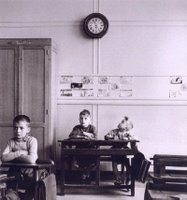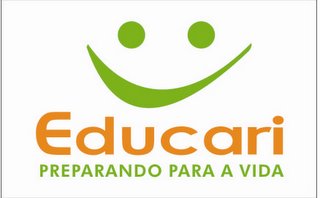Thursday, December 21, 2006
Tuesday, December 12, 2006
Nosso álbum de fotos
Enjoy!
Notícias da Prática Exploratória
O que conversamos:
1. Oficinas de PE ou de OLI: fazer sempre com encontros de 15 em 15 dias para dar tempo de leitura ou trabalho. Simone não pode comparecer mas mandou um e-mail com a sugestão: uma oficina exploratória em que os professores vivenciassem e repensassem sobre seus personagens em sala de aula. Que tantos papéis são esses que nos cobramos e que a sociedade nos cobra? Quais verdadeiramente interessam a nós mesmos e a nossos alunos? Alguém se habilita?
2. Projeto Allwright: poderá ter problemas para a continuidade pois estão mudando o representante do Conselho Britânico (Julian Wing) e o Secretário de Estadual de Educação.
3. 8º. Encontro da PE: as oficinas não ficaram muito cheias. A de violência (Rebeldes) teve 30 participantes mas a média foi de 20 em quase todas. Apenas a dos Primeiros Passos na PE é que teve poucos participantes, levando a uma proposta de não se oferecer mais (visto que o baixo número de participantes vem acontecendo nos anos passados) e Marja disse que teria uma outra proposta de trabalho. De modo geral, as oficinas foram caracterizadas como oficinas de reflexão, foram muito interessantes e animadas. Foi muito elogiado o cuidadoso trabalho de preparação da oficina de violência pelas alunas. Também foram elogiadas a qualidade dos pôsteres e a preocupação estética dos seus autores. Foi muito notada a integração dos alunos no encontro. Foi até sugerido que se organizasse uma oficina sobre fazer pôsteres, no próximo evento. Algumas pessoas sentiram falta de uma folha de avaliação ao final do encontro.
4. 9º. Encontro da PE: aproveitando o Encontro sobre Materiais Didáticos que será organizado na PUC, no fim de junho, pensou-se em fazer o 9º. Encontro na mesma ocasião. Ganharíamos em abrangência de público e muitos dos esforços seriam economizados.
5. 2007: já temos 2 convites: em fevereiro, no Curso pré-vestibular comunitário da E. E. Brigadeiro Schordt (em Jacarepaguá) e em maio, na FEUC (em Campo Grande). Quem vai querer participar do grupo?
6. Foram organizados vários Grupos de Trabalho.
1. GT de Sessões de Estudos da PE
2. GT de Captação de Recursos
3. GT de Oficinas (Aline, Iacy e Eliane se apresentaram para organizar)
4. GT de Eventos
5. GT da Web (Clarisse e Cristiane vão se encarregar) Deste setor já temos boas notícias: o blog novo já está inaugurado e o site já está com as obras mais encaminhadas. Até já tem um só endereço: http://www.letras.puc-rio.br/epcentre/epcentre.htm!!! Foram feitas propostas de termos o puzzle da semana, postagens diárias, divulgação para alunos etc...
7. Projeto Allwright: Aline e Iacy, do Projeto Allwright, estão querendo fazer, em fevereiro, uma ação multiplicadora do que elas fizeram neste projeto, nas suas Regiões Metropolitanas 2 (Aline) e 3 (Iacy). Elas pensaram em fazer uma sessão em cada uma de suas escolas e convidar professores de inglês que conhecem em escolas das suas regiões.
8. Mindbite: foi lembrado o canto da PE na revista da APLIERJ, a Mindbite. Quem tiver textos curtos pode preparar e nos mandar.
9. PE no Município: foi notada a falta do Município no 8º. Encontro. As organizadoras respondem que não foi por falta de convite nem por qualquer outro problema. E havia representantes da Secretaria no Evento do Projeto Allwright e no curso do Dick.
10. Captação de recursos: procurar o Itaú, a Telemar, o Bradesco. Cristiane já falou com um amigo que trabalha com captação de recursos e ficou-se de marcar uma reunião com ele, em janeiro de 2007.
Entrevista com a Professora Inés Miller
| What exactly is Exploratory Practice? Inés Kayon de Miller teaches under-graduate and post-graduate courses at the Departamento de Letras, PUC-Rio, Brazil. She has an MA degree in T.E.S.L. from U.C.L.A. and a Ph.D. in Linguistics from Lancaster University, UK. As teacher educator and consultant to public and private sector teachers, Inés has been actively involved in developing Exploratory Practice as a way of engaging teacher-learners and in-service teachers in sustainable professional development. This article was first published in MindBite the APLIERJ newsletter (2005.2). MB: Although I´ve heard you say that Exploratory Practice is difficult to define, could I ask you to do so for our readers? We've defined Exploratory Practice as “classroom language teachers and learners developing their own understandings of life in the language classroom (while getting on with their learning and teaching), with a view to enhancing the quality of the life they lead together, and thereby the quality of the education and the learning in that setting”. I´d like to highlight that, within Exploratory Practice, not only teachers but also learners become agents of their work for understanding. They can pursue the issues that puzzle them about their classroom lives while they work on their language learning and teaching. Maybe at this point I should explain that `we´ in the context of Exploratory Practice refers to a group of colleagues who have launched the Lancaster-based EPCentre to organize our international enterprise, which started in 1991, with Dick Allwright from Lancaster University, UK, acting as external consultant to the Cultura Inglesa, Rio. The EP core members with whom I have worked quite closely are: Dick Allwright, our mentor of Exploratory Practice; Maria Isabel A. Cunha (Bebel), my closest peer in the development and expansion of Exploratory Practice in Rio; and the growing group of colleagues who have multiplied our work in various institutional contexts in Rio, other parts of Brazil, and Europe (Portugal, Spain, England). MB: So, could we say that Exploratory Practice is a way of researching the classroom? I would say that Exploratory Practice is much more than a way of researching the classroom, it is a way of `being´ in the classroom. In our experience as EPCentre members, we have come to believe that Exploratory Practice sets an atmosphere and a discursive space that opens up opportunities for teachers and learners to address and reflect upon what is happening in their classrooms. We are exploiting the fact that at any point in our lives we all have some level of understanding of the life we are currently living and some degree of puzzlement. By intensifying all these processes, Exploratory Practice offers a way of working that enriches the `quality of life´ inside and, as we have noticed, outside the classroom. MB: What issues have been puzzling teachers and learners? Here are a few examples taken from the hundreds of teachers´ puzzles that have emerged over the past 15 years: Why aren´t we ever happy with our classroom work?, Why do I need my students to like me?, Why is evaluating so difficult?, Why does my responsibility increase while the students´ decreases?, Why are students so embarrassed to participate in oral activities?, Why are students so unmotivated when they have to learn English?, Why can´t I memorize all my students´ names? Some of the puzzles that have been pursued by learners are: Why can´t we understand what the teacher says?, Why don´t we have more English classes?, Why doesn´t the English at school prepare us for the workplace?, Is my study method any good?, Why do we have to respect a teacher?, Why do we have homework?, Why do we have to be tested when the teacher can assess us? As you can see, these are questions that we all have (or have had) about our classroom lives, both as teachers and as students. Our experience has shown that these puzzles arise in different contexts (public and private schools, language classes for various ages, university courses). Another interesting aspect that can be observed from the emerging puzzles is that most of them are about `life´ in classrooms in general and not necessarily only about English classes. Most of our work in our Exploratory Practice groups has been related to language education (English, Spanish, Portuguese), but we have also worked with teachers of other subjects (Arts, Geography, Physical Education.). MB: How have teachers and learners been pursuing their puzzles within Exploratory Practice? We need to emphasize that Exploratory Practice does not recommend definite procedures; it offers a set of principled guidelines for the development and use of locally appropriate investigative practices, and for the general conduct of such work for understanding. The built-in integration between the people involved in the puzzling situation (teachers, learners, colleagues, coordinators, parents, etc.) and their collective attempt to understand it as they engage in their regular activities enhance qualitatively the nature of the life `lived´ in that classroom. It is this integration between people, work, and understanding that also contributes to continuity. To be a little more specific, exploratory teachers and learners have used any pedagogic actions that make sense to them – walking around the classroom, talking to others, looking and listening more intensively, just to name a few– to `monitor´ what is going on apart from the strictly linguistic monitoring we sometimes restrict ourselves to. They´ve also looked for information to understand their puzzles by adapting their everyday language teaching/learning activities into potentially `exploratory´ pedagogic activities (PEPAs). Some classic PEPAs have been group discussions, role-plays, letter / composition / essay writing, texts / videos related to the focused puzzle, slightly adapted grammar exercises, interviews of colleagues and/or people who could help develop local understandings, among others. An important Exploratory Practice moment also happens when teachers and learners share their understandings in plenary discussions and in poster presentations during the annual Exploratory Practice events, which since 2002 have been held at PUC-Rio and attracted more than 200 participants. MB: How could APLIERJ and other teachers join the activities of the Rio EP Group? In fact, many APLIERJ colleagues and their learners from the public and private sectors are already working with us, but we are looking forward to enlarging our Exploratory Practice community of teachers and learners. So, I do encourage all interested teachers and learners to contact the Rio EP Group at epcentrerio@hotmail.com to find out about our calendar of local activities (EP sessions and/or workshops held at PUC-Rio or at other institutions). I also invite teachers and learners to visit the Exploratory Practice Centre sites, where they can find more information about the ideas and development of Exploratory Practice: December 06 2005
| ||
Sunday, December 03, 2006
Pela qualidade de vida em sala de aula
1. Trabalhar para entender a vida na sala de aula
2. Envolver todos neste trabalho
3. Trabalhar para a união de todos
4. Trabalhar também para o desenvolvimento mútuo
5. A fim de evitar que o trabalho esgote seus participantes, integrar este trabalho para o entendimento com as práticas da sala de aula.
6. Fazer com que o trabalho seja contínuo e não uma atividade dentro de um projeto.
7. Colocar a “qualidade de vida” em primeiro lugar.


